| Srl | Item |
| 1 |
ID:
067209
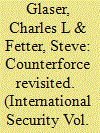

|
|
|
| 2 |
ID:
107172
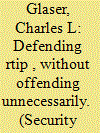

|
|
|
| 3 |
ID:
092261


|
|
|
|
|
| Publication |
2009.
|
| Summary/Abstract |
How can Japan put its past behind? Scholars, journalists, and activists frequently argue that Japan cannot solve its "history problem" unless it follows West Germany's lead in offering contrition for World War II violence. Into this debate, Jennifer Lind's Sorry States: Apologies in International Politics offers an original and provocative contribution. Lind argues that while countries should acknowledge past atrocities, frequent public apologies can be domestically polarizing and diplomatically counterproductive. Sorry States outlines a theory of remembrance and threat perception and tests it in a comparative study of Japanese-South Korean and Franco-German relations after World War II. Its methods, data, and findings will interest not only East Asianists, but also scholars of international reconciliation and security studies more broadly. This roundtable presents three critical essays in addition to a response by the author. They discuss the mechanisms through which historical memory influences perceptions of threat, the relative weight of ideational versus material factors in threat perception, and whether changes in international norms and economic interdependence may increasingly pressure countries to confront past violence.
|
|
|
|
|
|
|
|
|
|
|
|
|
|
|
|
| 4 |
ID:
065638
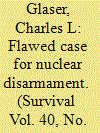

|
|
|
|
|
| Publication |
1998.
|
| Description |
p.112-128
|
|
|
|
|
|
|
|
|
|
|
|
|
|
|
|
| 5 |
ID:
149639


|
|
|
|
|
| Summary/Abstract |
In January 1980, U.S. President Jimmy Carter used his State of the Union address to announce that in order to protect “the free movement of Middle East oil,” the United States would repel “an attempt by any outside force to gain control of the Persian Gulf.” Carter and his successors made good on that pledge, ramping up U.S. military capabilities in the region and even fighting the Gulf War to prevent Saddam Hussein’s Iraq from dominating the region’s oil supplies.
|
|
|
|
|
|
|
|
|
|
|
|
|
|
|
|
| 6 |
ID:
124377
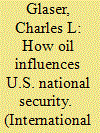

|
|
|
|
|
| Publication |
2013.
|
| Summary/Abstract |
How do states' oil requirements influence U.S. national security? Although a great deal of attention has focused on "energy security," scholars and policymakers lack satisfactory answers because little analysis links states' energy requirements with the probability of military conflict. Developing an analytic catalogue of the ways in which states' oil requirements could influence U.S. national security is the first step in closing this gap. Possible mechanisms include vulnerable access to oil that threatens a state's military capability; military policies designed to protect access to oil that threaten another state's military capability, which in turn create an access-driven security dilemma; and oil reserves that increase the value of territory, generating a conflict that draws in the United States via an alliance commitment. A distinctive feature of this framework is that some of these mechanisms identify threats to U.S. security that flow from another country's consumption of oil, not from U.S. consumption. Of particular importance is the potential danger that Chinese oil imports create for U.S. security-China's efforts to protect its sea lines of communication are fueling military competition that could strain U.S.-China relations and increase the probability of conflict between them. Policy options for dealing with these dangers share little with the standard options prescribed for dealing with the dangers related to Persian Gulf oil and U.S. oil consumption.
|
|
|
|
|
|
|
|
|
|
|
|
|
|
|
|
| 7 |
ID:
019906
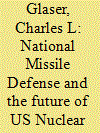

|
|
|
|
|
| Publication |
Summer 2001.
|
| Description |
40-92
|
| Summary/Abstract |
If U.S. national missile defense (NMD) were only about countering ballistic missiles deployed by rogue states, 1 then whether to deploy limited NMD would be a "normal" national security issue. The military-technical question would concern feasibility: Would the missile defense work against the small missile forces that a few states may eventually deploy? The military-political questions would concern the risks to the United States of being vulnerable to rogue-state missiles and the amount Washington should be willing to pay for insurance against these risks.
What makes NMD special is its unavoidable connection to U.S. strategic nuclear policy and to the United States' political relationships with Russia and China. Both states view U.S. NMD as a threat to their strategic nuclear capabilities and their relationship with the United States. If technically successful, even the limited NMD planned by the Clinton administration might in some scenarios undermine the capability of Russian nuclear forces. Russia will find limited NMD still more worrisome, anticipating that initial U.S. deployments would be followed by larger ones. The NMD system under development poses a larger and more immediate challenge to Chinese nuclear capabilities, which currently include only about 20 single-warhead intercontinental-range missiles. The Bush administration has called for more robust and ambitious NMD--possibly increasing the number of ground-based interceptors and adding sea- and space-based interceptors--which promises to make it still more threatening. 2 Moreover, some proponents favor deploying NMD not only against rogue states, but also against China and possibly Russia. For example, [End Page 40] Senator Jon Kyl (R-Arizona) reportedly said that "it's easy to talk about North Korea, Iran and Iraq, but . . . behind closed doors you hear some people expressing some concerns about ultimate threats like China."...
|
|
|
|
|
|
|
|
|
|
|
|
|
|
|
|
| 8 |
ID:
102339
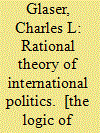

|
|
|
|
|
| Publication |
Princeton, Princeton University Press, 2010.
|
| Description |
xi, 314p.
|
| Standard Number |
9780691143712, hbk
|
|
|
|
|
|
|
|
|
|
|
|
Copies: C:1/I:0,R:0,Q:0
Circulation
| Accession# | Call# | Current Location | Status | Policy | Location |
| 055800 | 327.101/GLA 055800 | Main | On Shelf | General | |
|
|
|
|
| 9 |
ID:
013096
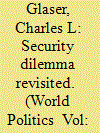

|
|
|
|
|
| Publication |
Oct 1997.
|
| Description |
171-201
|
|
|
|
|
|
|
|
|
|
|
|
|
|
|
|
| 10 |
ID:
147046
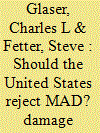

|
|
|
|
|
| Summary/Abstract |
As China invests in its nuclear forces and U.S.-China relations become increasingly strained, questions of U.S. nuclear doctrine require greater attention. The key strategic nuclear question facing the United States is whether to attempt to maintain and enhance its damage-limitation capability against China. The answer is less straightforward than it was during the Cold War, because China's nuclear force is orders of magnitude smaller than the Soviet force was. Part of the answer depends on the military-technical feasibility of the United States achieving a significant damage-limitation capability: What would be the outcome of military competition over the survivability of China's intercontinental ballistic missiles, submarine-launched ballistic missiles, and command and control, and over the effectiveness of U.S. ballistic missile defenses? The answer also depends on the benefits that a damage-limitation capability would provide; these could include contributions to homeland deterrence, extended deterrence, and reassurance of U.S. regional allies. The final piece of the analysis concerns the potential costs of a damage-limitation capability, which could include increased escalatory pressures during crises and growing political tension between the United States and China. A thorough analysis demonstrates that the United States should forgo such a capability because the prospects for preserving a significant damage-limitation capability are poor; the deterrent benefits would be small; and the escalatory and political costs would be relatively large.
|
|
|
|
|
|
|
|
|
|
|
|
|
|
|
|
| 11 |
ID:
138169
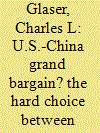

|
|
|
|
|
| Summary/Abstract |
China’s growing military power has fueled a security competition with the United States, increasing the risk of war between the two countries. To reduce this likelihood, the United States and China should negotiate a grand bargain in which the United States ends its commitment to defend Taiwan, and China agrees to resolve its maritime territorial disputes peacefully and accepts the United States’ long-term military presence in East Asia.
|
|
|
|
|
|
|
|
|
|
|
|
|
|
|
|
| 12 |
ID:
052052
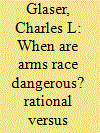

|
|
|
| 13 |
ID:
016671
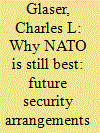

|
|
|
|
|
| Publication |
Summer 1993.
|
| Description |
5-50
|
|
|
|
|
|
|
|
|
|
|
|
|
|
|
|
| 14 |
ID:
106954


|
|
|
|
|
| Publication |
2011.
|
| Summary/Abstract |
This article first argues that states have not balanced against US unipolar power because the potential balancers do not view the United States as a major threat, because they believe it has benign security-seeking motives, at least with regard to other major powers. This explanation runs counter to the Brooks-Wohlforth argument, which holds that states are not balancing because the magnitude of the United States' power advantage makes balancing essentially infeasible. The second part of the paper challenges the conventional wisdom on the benefits of unipolarity, arguing that the benefits the United States derives from unipolarity are generally overrated. More specifically, US security need not be significantly reduced by growth in China's economy that supports a return to bipolarity.
|
|
|
|
|
|
|
|
|
|
|
|
|
|
|
|